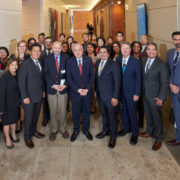
DURING a recent trip to Los Angeles, Philippine Ambassador to the United States Jose Manuel Romualdez visited Cedars-Sinai Medical Center, which is leading a research program into the health needs of Filipino Americans in Southern California and across the country.
While it’s common to see Filipinos among the majority of health and care providers worldwide, this local hospital — which employs over 3,000 Filipino Americans — seeks to present one of the most comprehensive profiles of the state of Fil-Am collective health.
The hospital has done similar inquiries into other underserved populations, such as the Korean American and Hispanic communities by conducting outreach and screenings at churches and other local events.
The convening on Monday, September 16 was attended by Philippine Consul General Adelio Cruz, Consulate delegates, and key leaders from Cedars-Sinai who recommended partnership ideas between the medical center and the Philippine government, as well as how it can engage Fil-Ams who are reluctant to seek medical care.
Cedars-Sinai’s Research Center for Health Equity conducted an initial survey this past summer and received about 500 respondents from the Fil-Am community. The full results of the survey are slated to be unveiled during a Filipino Cultural Day event in October at the hospital, Peachy Hain, executive director of medical and surgical services, said.

Hain, a Filipina American who has been at Cedars-Sinai for 40 years, organized Monday’s event after previously meeting with Consul General Cruz about the survey.
She asserted that the medical center has more to offer in terms of its outreach efforts within the Fil-Am population, which is considered the second-largest Asian American group in Southern California.
Some of the health findings of the survey include Fil-Am women having high rates of breast cancer and Fil-Ams showing the highest incidences of thyroid cancer and obesity among any Asian group, Dr. Robert Haile, director of the Research Center for Health Equity, said during his presentation.
“They’re not getting screened for cancers at the rate they should be. Health insurance is a concern…but they don’t see a need for going to the doctor unless they’re sick,” Haile told the group.
Romualdez suggested aligning with Filipino businesspeople like Manuel V. Pangilinan, who has invested in several cancer treatment centers and a children’s hospital in Metro Manila.
“What I would like to see down the road is hospitals to be able to share the information with the Philippines…” the ambassador said. “Perhaps that is what we’d like to ask in exchange for the service many Filipino doctors and nurses who work at [Cedars-Sinai].”
Dr. Dan Theodorescu, director of the Samuel Oschin Comprehensive Cancer Institute; Dr. Heitham Hassoun, vice president and medical director for international health; Janet Villarmia, executive director; and Josie De Jesus, hospital administrator were also among the Cedars-Sinai officials present on Monday.
Scholarly exchanges between the hospital and medical schools and nursing programs back in the Philippines were also suggested.
As the nation faces a shortage of registered nurses, California would be among the states hardest hit, with an estimated need of 193,000 new nurses by 2030, a report published in the American Journal of Medical Quality said.

With the Philippines continuing to be the leading exporter of nurses to the U.S., partnerships between the government and U.S.-based hospitals are one of the ways to address the void, officials said.
While Monday’s meeting was an exchange of ideas and verbal assurances, Cedars-Sinai officials said they will follow up with the local Consulate office to continue the dialogue.
“The fact that the leadership of Cedars-Sinai and the ambassadorial leadership came together is ground shaking,” Dr. Edwin Posadas, the medical director of the Urologic Oncology Program at Cedars-Sinai, told the Asian Journal. “This will allow us to make some long-lasting and an important impact on our understanding of Filipinos and their health issues, opportunities and barriers that will lead to changes in health care learning here in Los Angeles, across the U.S. and across the globe since Filipino immigrants are everywhere.”
The hospital also plans to do another round of the survey this fall.
Prior to visiting the hospital, the ambassador’s weekend schedule included a meeting with Mayor Eric Garcetti, a town hall session with Fil-Am community members, and a tour of local businesses.






